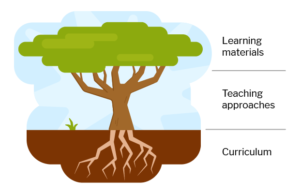At the Raspberry Pi Foundation, we have been investigating culturally relevant pedagogy and culturally responsive teaching in computing education. This is an important part of our research to understand how to make computing is accessible to all young people.
What is culturally relevant pedagogy?
“Culturally relevant pedagogy is a framework for teaching that emphasises the importance of incorporating and valuing all learners’ knowledge, ways of learning, and heritage. It promotes the development of learners’ critical consciousness of the world and encourages them to ask questions about ethics, power, privilege, and social justice. Culturally relevant pedagogy emphasises opportunities to address issues that are important to learners and their communities.
Culturally responsive teaching builds on the framework above to identify a range of teaching practices that can be implemented in the classroom. These include:
- Drawing on learners’ cultural knowledge and experiences to inform the curriculum
- Providing opportunities for learners to choose personally meaningful projects and to express their own cultural identities
- Exploring issues of social justice and bias”
A new guide for culturally responsive computing teaching
Using funding from a special projects grant from SIGCSE (ACM’s Special Interest Group in Computer Science Education), we established a working group of teachers and academics.
The working group met up over the course of three months to explore and discuss culturally relevant pedagogy. The result was a collaboratively written set of guidelines for culturally relevant and responsive teaching.

Teaching and curriculum design at three levels: Curriculum (the roots), teaching approaches (the branches), and learning materials (the leaves).
The guidelines are set out in three sections, which we have likened to the structure of a tree: the roots or basis of culturally relevant pedagogy lie in the focus of the curriculum; the branches are the different teaching approaches that can be taken to deliver the curriculum; the learning materials are represented by the leaves and are the most visible aspect of the lessons. Within each section of the guidelines, there are questions for reflection and suggested activities.
Further reading
- Pedagogy quick read
- Our blog post to introduce the guidelines
- A description of the project in Hello World issue 17
- Literature review
- Project report
- Localising culturally responsive computing teaching to an English context: developing teacher guidelines
Reflections from the working group
We asked the educators who took part in the working group what the experience had been like and why taking part had been important to them.
“I have been able to reflect on how to further improve my teaching practice and pedagogy to ensure that the curriculum taught is culturally diverse and caters for all learners that I teach. I plan to review the computing curriculum taught in my computing department and sit down with my colleagues to work on how we can implement the guidelines in our units of work for Key Stages 3 to 5.” – Joe Arday, computing teacher and working group member
“Our classrooms are a microcosm of the local population; it is therefore important for teachers to learn about culturally relevant pedagogy because it enables them to adopt a responsive pedagogy that expands the knowledge of young people that single perspective computing lessons have not been able to.” – Alain Ndabala, computing teacher and working group member
Equity, diversity and inclusion seminars
As part of our ongoing computing education research seminars, we organised a series of sessions on diversity and inclusion inviting experts from around the world to present their research. Topics spanned from generative justice, to ways of supporting young children with visual disabilities. Recordings and slides from the speakers’ presentations are also available, alongside the seminar proceedings which include written articles to accompany each seminar.
Our next step
In 2022, we will be continuing this work through the Raspberry Pi Computing Education Research Centre at the University of Cambridge, thanks to a donation from Google. This will involve working with teachers from a small number of schools to evaluate approaches to culturally responsive teaching of computing.